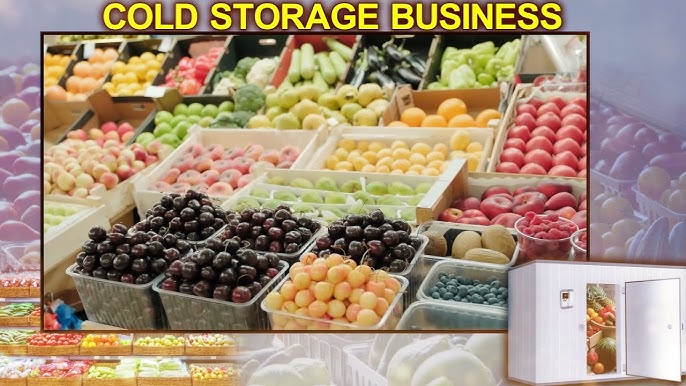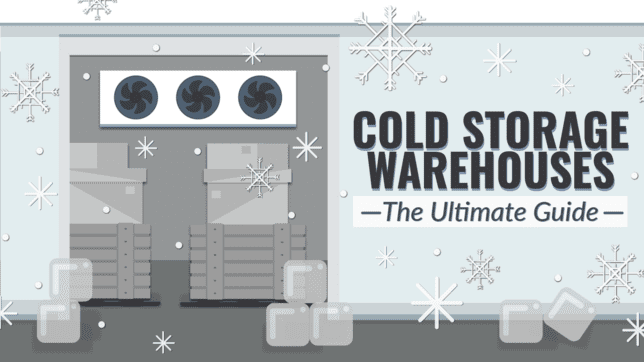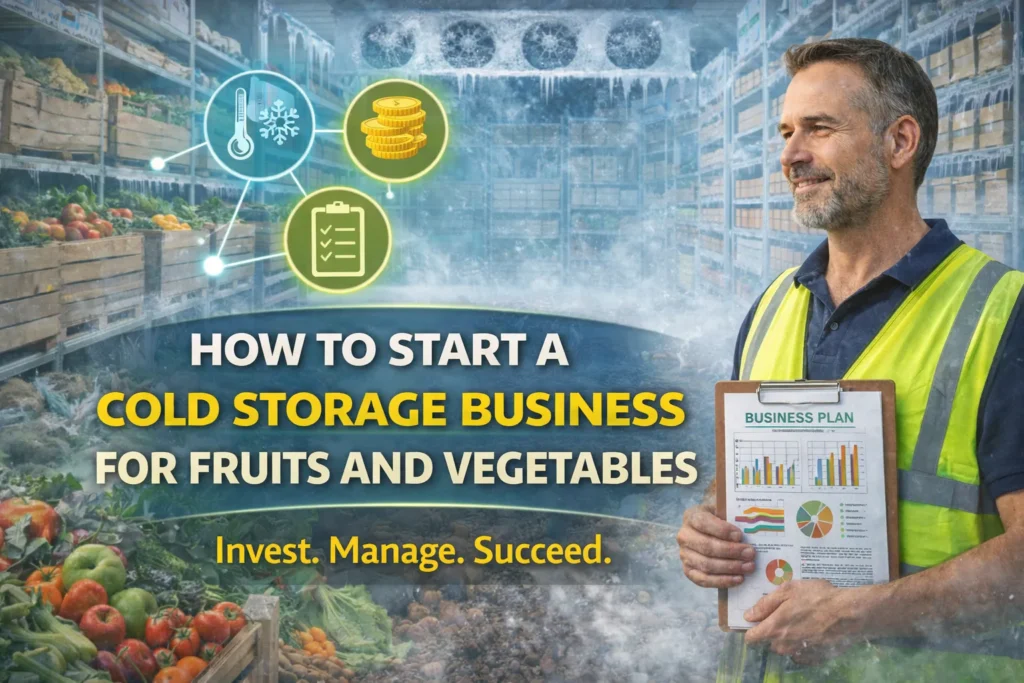Are you considering starting your own cold storage business for fruits and vegetables? You’re not alone.
With the rising demand for fresh produce year-round, this industry offers a profitable opportunity. But how do you get started? The process might seem daunting, but with the right approach, you can set up a successful business that keeps your customers happy and your produce fresh.
Imagine having the power to prevent spoilage and waste while ensuring that your fruits and vegetables remain crisp and delicious. Intrigued? Keep reading to discover the essential steps and insider tips that will guide you through launching your cold storage venture. Your journey to becoming a key player in the fresh produce market starts here.

Market Analysis
Starting a cold storage business for fruits and vegetables requires understanding market trends and consumer demand. Analyze local production volumes and seasonal fluctuations to ensure efficient storage and distribution. Identifying key competitors and potential clients will help in planning a profitable business model.
Understanding the market is crucial for anyone looking to start a cold storage business for fruits and vegetables. You need to know the demand, competition, and the specific needs of your target region. This analysis will guide your business strategies and help you make informed decisions.
Understanding Demand
Consider the types of fruits and vegetables that are most popular in your area. Are there seasonal variations? Knowing which produce is in high demand can help you decide what to focus on.
Identify trends such as organic produce or exotic fruits. These trends can create unique opportunities for your business.
Analyzing Competition
Research existing cold storage facilities in your region. What services do they offer, and what are their strengths and weaknesses? This insight can help you find a niche or improve on their offerings.
Visit local markets and talk to vendors about their storage needs. You might discover gaps in the current market that you can fill.
Identifying Target Customers
Who will benefit most from your cold storage services? Think about local farmers, wholesalers, or retailers who could use better storage solutions.
Talk to potential customers to understand their challenges and what they value most in a storage facility. You can tailor your services to meet their needs effectively.
Assessing Geographic Factors
Location is key in the cold storage business. Consider how close you are to production areas and distribution centers. Proximity can save costs and attract more clients.
Evaluate the transportation infrastructure. Efficient logistics are vital for maintaining the freshness of produce, which can be a selling point for your business.
Exploring Technological Advancements
Stay informed about the latest technology in cold storage. Innovations like energy-efficient cooling systems or smart inventory management can give you a competitive edge.
Think about how technology can improve your operations and customer satisfaction. Could you implement a tracking system for transparency?
Considering Economic Factors
Examine the economic climate of your region. Are there any government incentives for agricultural businesses? These can reduce your startup costs.
Keep an eye on inflation rates and economic policies that could affect the prices of fruits and vegetables. This will help you plan your pricing strategy.
By conducting a thorough market analysis, you position your business for success. What insights have you gathered that could shape your strategy?

Business Plan Essentials
Starting a cold storage business for fruits and vegetables requires a solid plan. A well-crafted business plan guides your actions. It helps in making informed decisions. It also attracts potential investors and partners. Below are some essential components of a business plan.
Market Research
Understanding the market is crucial. Identify potential customers and competitors. Analyze demand for cold storage facilities. Look into trends affecting fruit and vegetable supply. This helps in positioning your business effectively.
Financial Projections
Financial projections give an overview of expected revenue and costs. Estimate initial investment needs. Consider costs for equipment, location, and staffing. Forecast your profit margins. This prepares you for financial challenges ahead.
Location And Facilities
Choosing the right location is vital. It should be accessible to suppliers and customers. Ensure the facility meets industry standards. Consider the size and scalability of the space. The location impacts your operational efficiency.
Regulatory Compliance
Compliance with regulations is non-negotiable. Research local and national laws. Obtain necessary licenses and permits. Ensure the facility meets health and safety standards. Compliance builds trust with clients and partners.
Marketing Strategy
Develop a marketing plan to reach target customers. Identify channels to promote your services. Create compelling messages highlighting your unique strengths. A strong marketing strategy attracts business and generates revenue.
Operations Plan
Outline daily operations and management strategies. Define roles and responsibilities for staff. Plan for maintaining and managing the facility. Efficient operations ensure smooth business functioning.
Legal And Regulatory Requirements
Starting a cold storage business involves understanding legal and regulatory requirements. Secure necessary permits and licenses for food storage. Follow health and safety standards to ensure compliance with local regulations.
Starting a cold storage business for fruits and vegetables can be a lucrative venture. But before you dive in, understanding the legal and regulatory requirements is crucial. These rules ensure your business operates smoothly and meets industry standards. Let’s navigate through these essential legalities.
Understanding Business Licensing And Permits
Before launching your cold storage facility, securing the right licenses and permits is a must. These vary by location, so check with local authorities for specific requirements. Usually, a business license and environmental permits are necessary to comply with health and safety standards.
Complying With Health And Safety Regulations
Safety is non-negotiable in the cold storage industry. You need to adhere to health and safety regulations to protect both your employees and stored goods. Implementing regular safety checks and staff training can help you stay compliant. What protocols do you have in place to ensure a safe working environment?
Meeting Environmental Standards
Cold storage facilities have a significant environmental impact. You must ensure your business meets environmental standards to minimize your carbon footprint. Consider energy-efficient refrigeration systems to reduce emissions. How can you make your cold storage more sustainable?
Understanding Tax Obligations
Navigating tax obligations can be tricky but crucial. Register for the appropriate tax identification numbers and understand the tax rates applicable to your business. Consulting a tax professional can help you avoid costly mistakes and keep your business financially healthy.
Ensuring Proper Insurance Coverage
Insurance protects your business from unforeseen events. You need policies covering property, liability, and possibly product loss. Evaluate different insurance options and choose plans that best safeguard your investments. Are you prepared for unexpected challenges?
Adhering To Food Safety Standards
Food safety standards are vital in a cold storage business. These ensure the quality and safety of stored fruits and vegetables. Implement a robust food safety management system and conduct regular audits. How will you maintain the highest food safety standards in your facility?
Understanding and meeting legal and regulatory requirements can set your cold storage business up for success. It may seem overwhelming, but with the right planning, you can navigate these complexities. Remember, a well-regulated business not only thrives but also gains trust from customers and partners alike.

Operational Strategies
Running a cold storage business for fruits and vegetables needs smart strategies. Keeping produce fresh is key. It ensures customer satisfaction and business success. Let’s explore effective operational strategies.
1. Optimize Storage Temperature
Different fruits and vegetables need different temperatures. Research the ideal storage conditions for each type. Use advanced refrigeration systems to maintain these conditions. This prevents spoilage and extends shelf life.
2. Efficient Inventory Management
Track inventory accurately. Use digital tools to monitor stock levels. This helps avoid overstocking or shortages. Efficient inventory management saves costs and reduces waste.
3. Regular Equipment Maintenance
Check your cooling systems regularly. Ensure they function properly. Scheduled maintenance prevents unexpected breakdowns. It keeps operations running smoothly and reduces repair costs.
4. Staff Training And Development
Train staff on handling produce correctly. They should know temperature requirements and storage techniques. Proper training minimizes mistakes and boosts efficiency.
5. Implement Energy-saving Practices
Use energy-efficient refrigeration systems. Insulate storage units to reduce energy consumption. This lowers operational costs and is environmentally friendly.
6. Establish Strong Supplier Relationships
Build good relationships with suppliers. Reliable suppliers ensure timely delivery of fresh produce. Consistent supply keeps your business stable and customers happy.
Conclusion
Starting a cold storage business for fruits and vegetables can be rewarding. It requires careful planning and dedication. Focus on choosing the right location. Invest in quality equipment. Understand market needs and trends. Build strong relationships with suppliers and customers.
Ensure your facility meets health and safety standards. Managing costs effectively is vital. Remember, consistent quality and reliability build trust. Stay informed about industry changes. This helps in adapting your business. Success takes time and effort, but it’s achievable. With hard work, your business can thrive.
Enjoy the journey of entrepreneurship in this essential field.



